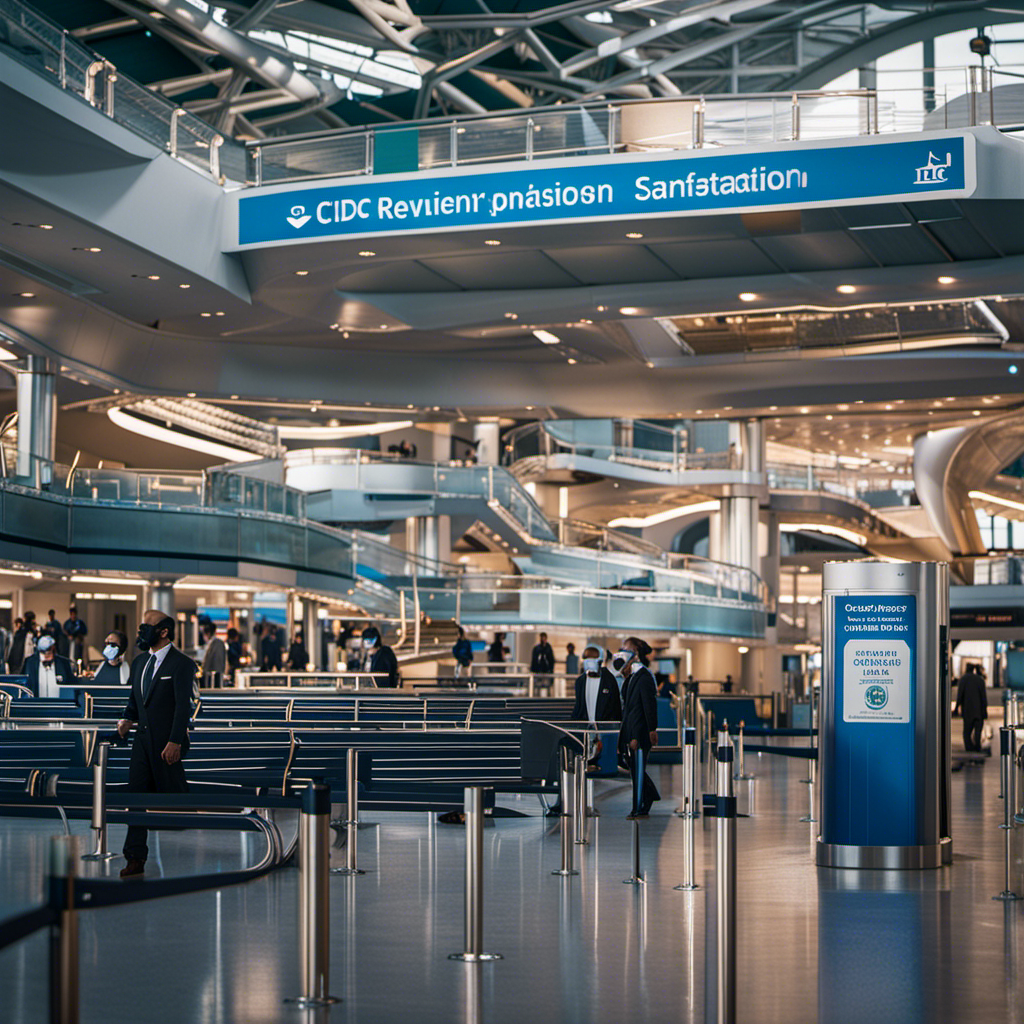As someone who is eager to start traveling again, the most recent announcement from the Centers for Disease Control and Prevention (CDC) marks a significant milestone on our journey towards restoring normal life.
The voluntary Covid program for cruise ships, which provided guidance on testing, outbreak response, and contact tracing, has come to an end. Now, it is up to the cruise lines themselves to implement their own protocols.
This decision by the CDC may lead to a gradual easing of testing and vaccination requirements, as the current strain of Covid appears to be less severe. However, transparency through regular reporting of case counts remains crucial.
Key Takeaways
- CDC has dropped its voluntary Covid program for cruise ships, shifting the responsibility of implementing protocols to the cruise lines themselves.
- The color-coded system for tracking cases on cruise ships, as well as the public reporting of ships with possible cases, has been discontinued by the CDC.
- Cruise lines may start relaxing testing and vaccination requirements in the near future, although vaccination requirements may still remain in place for now.
- CDC’s action is a significant step towards the return to normalcy, and it is expected that cruise lines will gradually ease rules and regulations.
cruise ship COVID-19 testing kits
As an affiliate, we earn on qualifying purchases.
As an affiliate, we earn on qualifying purchases.
The CDC’s Decision to End the Voluntary Covid Program
I’m relieved to hear that the CDC has ended the voluntary Covid program for cruise ships. This means that cruise lines will now be in charge of their own protocols. This decision has significant implications for the cruise industry and addresses many passenger concerns.
The program provided guidance for ships to sail safely, including testing, outbreak response, and contact tracing protocols. However, many of these procedures were already implemented by cruise lines.
The CDC’s color status report, which tracked cases on each ship, has also been retired. Passengers can now contact their cruise line directly for information on outbreaks, as there will be no public reporting of ships with possible cases.
This change may lead to cruise lines gradually easing testing and vaccination requirements, although vaccination requirements may remain in place for now.
Overall, this decision marks a major milestone for the return to normalcy and may bring about positive changes for the industry and passengers alike.

ZHIYULE Contact Lens Applicator & Remover Tool Kit | Professional Insertion/Removal Device for Soft & Colored Contact Lenses | Perfect for Daily Use, Cosplay, Colored Contacts & Travel
【DUAL FUNCTION DESIGN】Combined contact lens applicator and remover tool provides complete solution for inserting and removing soft contact…
As an affiliate, we earn on qualifying purchases.
As an affiliate, we earn on qualifying purchases.
Implications for Cruise Ship Protocols
It’s important to consider the implications for cruise ship protocols following the CDC’s decision to end its voluntary Covid program. With the responsibility now falling on the cruise lines themselves, passengers may have certain expectations for their safety and well-being. Here are three key points to keep in mind:
-
Cruise Line Responsibility:
-
Cruise lines are now solely responsible for establishing and implementing their own protocols to ensure the safety of passengers and crew.
-
Passengers may expect cruise lines to prioritize health and safety measures, such as enhanced cleaning procedures and regular testing.
-
It will be crucial for cruise lines to communicate their protocols transparently to instill confidence in passengers.
-
Passenger Expectations:
-
Passengers may expect clear communication regarding vaccination requirements and testing procedures.
-
They may also expect cruise lines to have contingency plans in place in case of a potential outbreak or emergency situation.
-
Passengers may look for reassurance that their health and safety are prioritized throughout their cruise experience.
Considering these factors, cruise lines will need to carefully navigate passenger expectations while implementing effective protocols to ensure a safe and enjoyable cruising experience.
cruise line health and safety protocols
As an affiliate, we earn on qualifying purchases.
As an affiliate, we earn on qualifying purchases.
Changes in Tracking and Reporting of Covid Cases
The removal of the color-status tracking system by the CDC signals a shift in how cases of Covid are reported and tracked on cruise ships. This change in reporting means that there will no longer be a public display of ships with possible cases. Passengers who want information on outbreaks will need to contact their cruise line directly. However, cruise lines will still be required to report cases to the CDC. This change in tracking and reporting may have implications for passengers, as it follows a trend of relaxing rules during the pandemic. Cruise lines may start easing testing and vaccination requirements, although vaccination requirements may remain in place for now. It is important for passengers to stay informed about the changes in reporting and passenger information provided by their chosen cruise line.
| Changes in Reporting and Passenger Information |
|---|
| No public reporting of ships with possible cases |
| Passengers need to contact cruise line for outbreak information |
| Cruise lines still required to report cases to the CDC |

CDC Vaccination Card Protector 4 x 3 Inch Immunization Card Holder Pack of 2, Vaccine Card Protector, Clear Protective Sealable Plastic Sleeve, ID Card Holder
CDC card holder
As an affiliate, we earn on qualifying purchases.
As an affiliate, we earn on qualifying purchases.
Potential Relaxation of Rules for Passengers
Relaxation of rules for passengers on cruises may include easing of testing and vaccination requirements. As cruise lines adapt to the changing landscape of the pandemic, there are potential changes that passengers may experience. Here are some key points to consider:
-
Testing requirements: Some cruise lines have already dropped testing requirements for fully vaccinated passengers. This may allow for a smoother and less restrictive boarding process.
-
Vaccination requirements: While vaccination requirements may remain in place for now, there is a possibility that they could be relaxed in the future. This would depend on the overall safety guidelines and the prevalence of the virus.
-
Passenger safety measures: Despite potential relaxation of guidelines, passenger safety will still be a top priority for cruise lines. Enhanced cleaning protocols, social distancing measures, and other safety measures will likely continue to be in place.
It is important to note that any changes in rules and guidelines will be made with the utmost consideration for passenger safety and the overall health and well-being of all individuals onboard.
The Impact on the Return to Normalcy
Reaching a milestone, the action taken by the CDC paves the way for a gradual return to normalcy in the cruise industry.
The CDC’s decision to end its voluntary COVID program for cruise ships has significant implications for the future of cruise vacations and the overall impact on the travel industry.
With the program retired, cruise lines will now be in charge of their own protocols, allowing them more flexibility in implementing testing and vaccination requirements.
While Covid is still active, the current strain appears to be less severe, and the CDC’s change makes it more likely for rules to be eased.
However, regular reporting of case counts would be beneficial for transparency, ensuring passengers have the necessary information to make informed decisions about their travel plans.
Overall, this development is a positive step towards the resumption of safe and enjoyable cruise vacations.
The Role of Cruise Lines in Ensuring Safety
Taking responsibility for their own protocols, cruise lines are now tasked with ensuring the safety of their passengers and implementing necessary measures. With the CDC’s voluntary Covid program for cruise ships being retired, cruise lines have taken on the responsibility of developing and enforcing safety protocols to protect their passengers. This includes implementing testing, outbreak response, and contact tracing measures. Cruise lines have been proactive in implementing safety procedures even before the CDC program, and all major cruise ships voluntarily joined the program. However, with the removal of the color-status tracking system, passengers will need to contact their cruise line for information on outbreaks. This change may also lead to potential changes in testing and vaccination requirements, with cruise lines potentially easing these rules in the near future. It is crucial for cruise lines to prioritize passenger safety and continue to report cases to ensure transparency and accountability.
| Cruise Line Responsibility | Passenger Safety Measures |
|---|---|
| Develop and enforce safety protocols | Implement testing, outbreak response, and contact tracing measures |
| Ensure transparency and accountability | Prioritize passenger safety |
| Report cases to the CDC | Maintain effective communication with passengers |
| Continuously update and adapt protocols | Implement measures to prevent and mitigate outbreaks |
Considerations for Testing and Vaccination Requirements
Now let’s discuss some important considerations for testing and vaccination requirements for cruise ship passengers. When planning a cruise, there are a few things you should keep in mind:
-
Testing: It is important to check the testing requirements set by the cruise line before you embark on your trip. Some cruise lines may still require passengers to provide proof of a negative COVID-19 test result before boarding. Make sure to stay updated on any changes to these requirements, as they may vary depending on the destination and the cruise line.
-
Vaccination: While some cruise lines have dropped testing requirements, vaccination requirements may still be in place. It is essential to understand the vaccination policy of the cruise line you plan to sail with. Ensure that you have received the necessary vaccinations and carry the required documentation with you.
-
Health and Safety Protocols: Even if testing and vaccination requirements are relaxed, it is important to remember that COVID-19 is still a concern. Cruise lines may continue to implement health and safety protocols, such as increased sanitation measures and social distancing guidelines, to ensure the safety of passengers and crew.
-
Travel Insurance: Considering the evolving situation with COVID-19, it is advisable to have travel insurance that covers any unforeseen circumstances related to the pandemic. This can provide peace of mind and financial protection in case of trip cancellations or medical emergencies.
-
Flexibility: Lastly, it is important to be flexible and adaptable during these times. COVID-19 regulations and requirements can change rapidly, so it is crucial to stay informed and be prepared for any changes that may affect your cruise experience.
The Need for Transparent Reporting and Communication
Understanding the importance of transparent reporting and communication is crucial for ensuring the safety and well-being of all individuals involved in the cruise industry.
Transparency in reporting allows passengers to have access to accurate and timely information about any potential outbreaks or cases on board a cruise ship. It enables them to make informed decisions about their travel plans and take necessary precautions.
Additionally, transparent reporting allows cruise lines to effectively manage and respond to any health-related incidents, implementing appropriate measures to contain the spread of infections and protect the health of passengers and crew members. It fosters trust and confidence among passengers, knowing that their well-being is a top priority.
Ultimately, transparent reporting and communication contribute to maintaining a safe and secure environment for everyone in the cruise industry.
Frequently Asked Questions
How Will the Cdc’s Decision to End the Voluntary Covid Program for Cruise Ships Affect the Protocols Implemented by Cruise Lines?
The CDC’s decision to end the voluntary Covid program for cruise ships means that cruise lines will now be in charge of their own protocols. This could lead to changes in cruise protocols and potentially impact the cruise industry’s return to normalcy.
Will There Be Any Changes in the Tracking and Reporting of Covid Cases on Cruise Ships Following the Removal of the Color-Coded System?
There may be changes in tracking and reporting of Covid cases on cruise ships after the removal of the color-coded system. This could impact cruise protocols and transparency in reporting outbreaks.
Can Passengers Expect Any Relaxation of Rules Such as Testing and Vaccination Requirements in Light of the Cdc’s Action?
Passengers may see a relaxation of rules like testing and vaccination requirements due to the CDC’s decision. Cruise lines have already dropped some testing requirements, but vaccination requirements may still remain in place for now.
What Is the Potential Impact of the Cdc’s Decision on the Return to Normalcy in the Cruise Industry?
The potential economic impact of the CDC’s decision on the return to normalcy in the cruise industry is uncertain. While it may alleviate concerns about public health, it could also lead to relaxation of rules and potential risks.
What Role Do Cruise Lines Have in Ensuring the Safety of Passengers and Preventing the Spread of Covid-19 on Their Ships?
Cruise lines are responsible for implementing passenger safety measures and preventing the spread of Covid-19 on their ships. This includes protocols like testing, vaccination requirements, outbreak response, and contact tracing.










